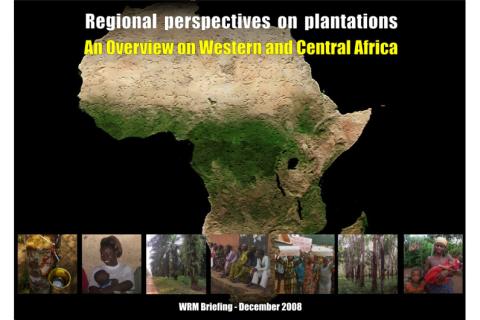Oil palm and rubber plantations occupy extensive areas in many countries in tropical Africa. In spite of their social and environmental impacts, until now they have received scant attention both at the national and international level.
Publications
Switching from fossil to alternative liquid fuels would appear to be a good idea, particularly in the context of climate change. Such is the case of converting the cellulose contained in plants into different types of fuels, among which liquid ethanol, that could be used in transport as an alternative to gasoline. However, current developments in this field show a number of threats that need to be highlighted.
WRM contribution to the Convention on Climate Change
Forests, everyone knows, are good for the climate – which makes it all the more important that governments and international community should work to protect them. But many current efforts to link forest conservation with climate change mitigation are sadly confused. It is important that parties to the UN Convention on Climate Change understand why.
Being “carbon neutral” has become fashionable. The World Bank, the Vatican, the World Olympics, the Football World Cup, the Body Shop, the Rolling Stones, and a long list of celebrities proclaim themselves to be totally or partially “carbon neutral”. Even Mercedes Benz held in California what was described as “the world’s first ever carbon neutral fashion week”! It is therefore understandable that the New Oxford American Dictionary proclaimed "carbon neutral" as its Word of the Year in 2006.
By Ivonne Ramos and Nathalia Bonilla
Testimonials on a socially and environmentally destructive forestry model
Joint Research of Acción Ecológica and WRM
Women, Communities and Plantations in Ecuador
Plantations are monocultures, created from seemingly endless rows of identical trees. They suck the water out of nearby streams and ponds and lower the water table, leaving little or no water for people living near the plantations. They deplete soils, pollute the environment with agrotoxics and eradicate biodiverse local ecosystems. Activists in Brazil call them the green desert because of the way they destroy local people's livelihoods and environments.
The environmental impacts of industrial tree monocultures have been widely documented, as have the effects of this industry on local communities in the countries of the South. However, relatively little is known about the working conditions of those who are employed on these plantations and the effects of this work on their health.
Until now the debate over genetically modified organisms – also known as transgenic organisms – has mainly focused on agricultural crops, and only to a much lesser extent on genetically modified trees. This is understandable, given that transgenic crops such as corn and soybeans are already being commercially grown and will be directly or indirectly eaten by human beings, posing a potential threat to their health.
Transgenic Trees
Impacts of Eucalyptus Monocultures on Indigenous and Afrobrazilian Women in the State of Espírito Santo.
By Gilsa Barcellos and Simone Ferreira
Women and Eucalyptus. Stories of Life and Resistance
Also available in Portuguese
By Chris Lang and Timothy Byakola
Selection of articles published in the monthly electronic bulletin of the World Rainforest Movement, addressing the impacts of the oil palm plantations in the forestss.
Oil Palm. From Cosmetics to Biodiesel, Colonization Lives On











